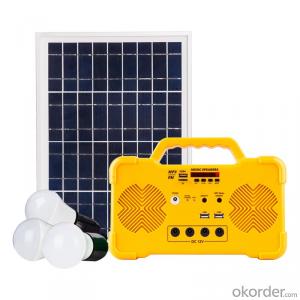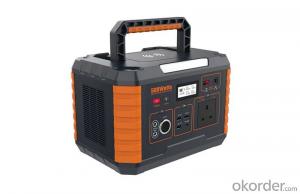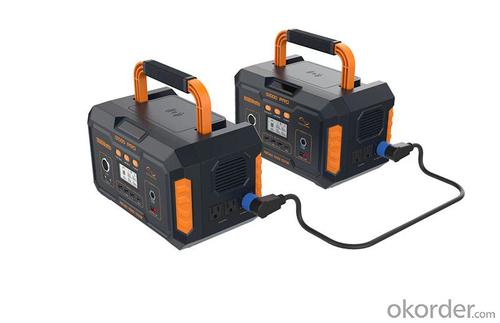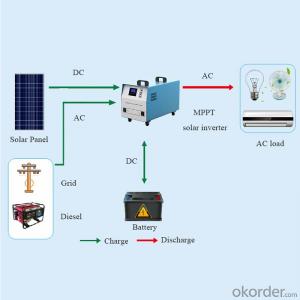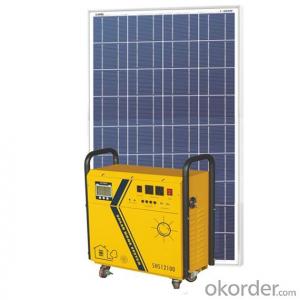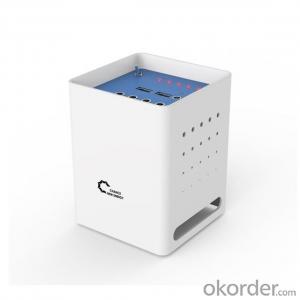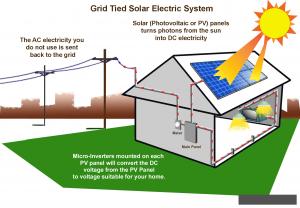oem ,odm ,500w, 1000w ,1500w lithium Portable home use solar energy system
- Loading Port:
- Shanghai
- Payment Terms:
- TT or LC
- Min Order Qty:
- 10 set
- Supply Capability:
- 5000 set/month
OKorder Service Pledge
OKorder Financial Service
You Might Also Like
Specification
This solar lighting system is ideal for places with no mains electricity such as outhouses, sheds, garages, farms, stables, as well as for camping, travel and any outdoor activities (e.g. a for a yurt).
The system is fully independent from the grid / AC power source and works purely based on sunlight energy.
During the daytime, the 12W solar panel charges a 12V battery inside the control unit, which then provides power to the 2 x 3W 12V LED lights connected via front sockets on the control unit.
In addition, there is a standard 5V USB socket for charging mobile phones and USB compatible devices (adaptors for USB-compatible mobile phones are included).
The control unit has a built-in 4Ah battery with an automatic solar charge controller to manage the charging process and prevent overcharging.
The 12W solar panel supplied with the system can fully charge this battery within about 7-8 hours of bright sunshine (longer in cloudy weather), and the battery can provide enough energy to power 2 LED lights continuously for 14 hours, or twice as long if only one LED lights are connected.
The system is very convenient to use and install: the solar panel comes with 5m cable and each LED light comes with 4m cable with an On/Off switch.
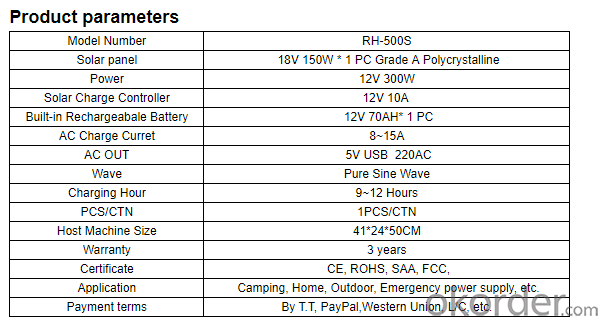
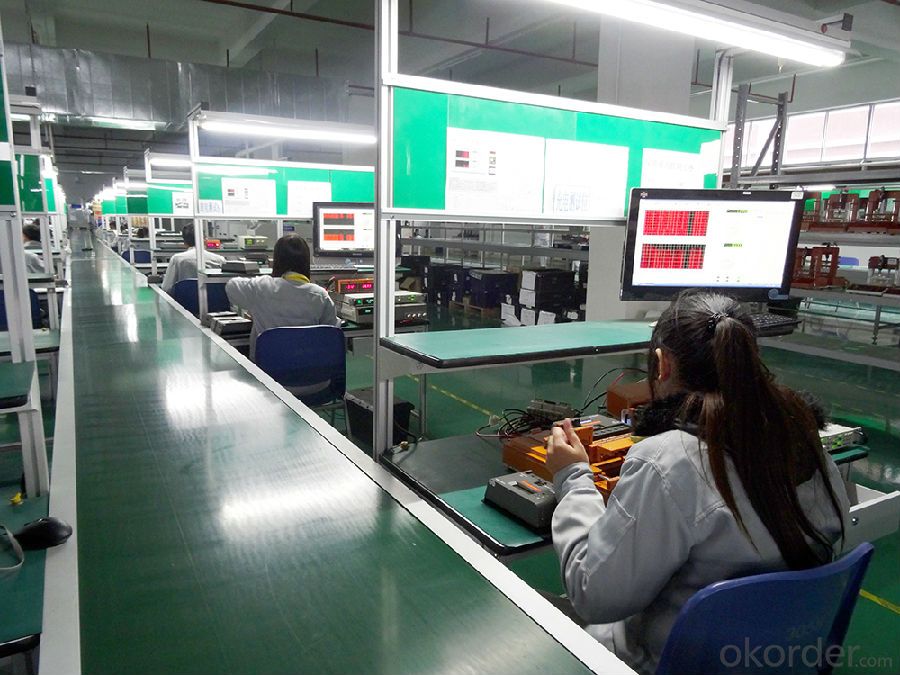
- Q: What are the environmental impacts of solar energy systems?
- Solar energy systems have numerous environmental benefits, including reducing greenhouse gas emissions, minimizing air and water pollution, and preserving natural resources. However, the manufacturing and disposal processes of solar panels can generate some waste and require energy inputs. Additionally, land use for large-scale solar installations can impact local ecosystems. Overall, the environmental impacts of solar energy systems are significantly lower compared to conventional energy sources.
- Q: Can solar energy systems be used in areas with limited access to solar fuses and breakers?
- Yes, solar energy systems can be used in areas with limited access to solar fuses and breakers. While fuses and breakers are important components for safety and protection in solar energy systems, alternative methods can be employed to ensure safe and efficient operation. These may include using other types of protective devices or implementing innovative system designs that minimize the need for fuses and breakers. Additionally, regular maintenance and monitoring can help identify and rectify any issues that may arise in the absence of traditional protective devices.
- Q: Do solar energy systems require a battery for storage?
- No, solar energy systems do not necessarily require a battery for storage. While batteries can be used to store excess solar energy for later use, it is not a mandatory component of a solar energy system.
- Q: What is the impact of dust storms on solar panels?
- Dust storms can have a negative impact on solar panels as they can reduce the panels' efficiency by blocking sunlight and reducing the amount of energy they can generate. The accumulation of dust on the panels can also lead to overheating, which can further decrease their performance and potentially damage the panels if not cleaned regularly.
- Q: How does net metering work?
- Net metering is a billing arrangement that allows customers with solar panels or other renewable energy systems to receive credit for any excess electricity they generate and feed back into the grid. The electricity meter measures the difference between the energy consumed from the grid and the energy generated by the customer's system. This net difference determines the amount of energy credited or charged to the customer's account. In essence, net metering enables homeowners to offset their electricity costs and promotes the adoption of clean energy sources.
- Q: What is the role of solar energy systems in promoting social equity?
- Solar energy systems play a crucial role in promoting social equity by creating equal opportunities for all individuals, regardless of their socioeconomic status. One of the key benefits of solar energy is its ability to reduce energy costs for households and communities. By installing solar panels, individuals can generate their own clean and renewable energy, thereby reducing their reliance on expensive fossil fuels and traditional energy sources. This reduction in energy costs is particularly significant for low-income households, who often spend a higher percentage of their income on energy bills. Solar energy systems provide them with an opportunity to decrease their energy expenses, freeing up resources to be allocated towards other essential needs such as education, healthcare, or food. By reducing the financial burden of energy costs, solar energy promotes social equity by helping to alleviate poverty and improve the overall quality of life for disadvantaged communities. Furthermore, solar energy systems contribute to the creation of green jobs and economic opportunities. The installation, maintenance, and operation of solar panels require a skilled workforce, offering employment opportunities for individuals in local communities. This can particularly benefit marginalized populations who might face barriers to employment due to limited access to education or discrimination. By providing job opportunities in the renewable energy sector, solar energy systems contribute to reducing income inequality and promoting social mobility. Solar energy also has a positive impact on environmental and public health, which is crucial for promoting social equity. Traditional energy sources, such as coal or natural gas, contribute to air pollution and climate change, disproportionately affecting low-income communities and communities of color. These communities often live in close proximity to power plants or industrial areas, leading to higher rates of respiratory diseases and other health issues. By transitioning to solar energy systems, these communities can benefit from cleaner air and reduced pollution, leading to improved public health outcomes and a more equitable distribution of environmental benefits. Solar energy promotes social equity by addressing environmental injustices and ensuring that all individuals have equal access to clean and healthy environments. In conclusion, solar energy systems play a vital role in promoting social equity by reducing energy costs, creating job opportunities, improving public health, and addressing environmental injustices. By providing equal access to clean and affordable energy, solar power helps level the playing field and ensures that all individuals, regardless of their socioeconomic status, can enjoy the benefits of renewable energy.
- Q: Can solar energy systems be used for recreational vehicles or boats?
- Yes, solar energy systems can be used for recreational vehicles or boats. These systems, commonly known as solar panels or photovoltaic systems, can provide a sustainable and renewable source of power for charging batteries and running various appliances on board. They are especially useful for off-grid adventures, allowing individuals to enjoy their outdoor experiences while reducing their carbon footprint.
- Q: Are there any limitations to the amount of electricity a solar energy system can generate?
- Yes, there are limitations to the amount of electricity a solar energy system can generate. The primary limitation is the availability of sunlight. Solar panels require direct sunlight to generate electricity, so factors such as weather conditions, geographical location, and time of day can affect the amount of sunlight received. Cloudy or rainy days can significantly reduce the electricity output of a solar energy system. Another limitation is the physical space available for installing solar panels. The size and number of panels that can be installed depend on the available roof or ground space. Limited space can restrict the overall capacity of the system and, consequently, the amount of electricity it can generate. Additionally, the efficiency of solar panels is a determining factor. The efficiency of converting sunlight into electricity varies depending on the type and quality of solar panels used. Higher efficiency panels can generate more electricity than lower efficiency ones. Furthermore, solar energy systems are also subject to degradation over time. Solar panels experience a gradual decrease in efficiency as they age due to factors like exposure to sunlight, temperature fluctuations, and environmental conditions. This degradation can reduce the overall electricity generation capacity of the system. Finally, energy storage is a limitation. Solar energy systems generate electricity during the day, but the demand for electricity often remains constant throughout the day and night. Without an efficient energy storage system, excess electricity generated during the day is wasted if not used immediately. Therefore, the inability to store excess electricity limits the overall amount that can be generated by a solar energy system. In summary, while solar energy systems offer a sustainable and renewable source of electricity, there are limitations to the amount they can generate due to factors such as sunlight availability, physical space, panel efficiency, system degradation, and energy storage capabilities.
- Q: Do solar energy systems require specialized cleaning?
- Specialized cleaning is indeed necessary for solar energy systems. Although solar panels are designed to have some level of self-cleaning capability, they can still gather dirt, dust, pollen, bird droppings, and other debris over time, leading to a decrease in efficiency. To maintain optimal performance, regular cleaning is essential. However, cleaning solar panels can be a sensitive undertaking due to the materials they are made of. Incorrect cleaning products or techniques can result in panel damage and the voiding of their warranty. Consequently, it is advisable to engage professionals or adhere to the manufacturer's cleaning guidelines for solar energy systems.
- Q: Can solar energy systems be used in apartment buildings or multi-unit dwellings?
- Yes, solar energy systems can be used in apartment buildings or multi-unit dwellings. In fact, they are increasingly being implemented in such settings to meet the energy needs of multiple households. Solar panels can be installed on the rooftops of apartment buildings, and the generated energy can be shared among the units. This allows for a sustainable, cost-effective, and environmentally friendly energy solution for these types of residential complexes.
Send your message to us
oem ,odm ,500w, 1000w ,1500w lithium Portable home use solar energy system
- Loading Port:
- Shanghai
- Payment Terms:
- TT or LC
- Min Order Qty:
- 10 set
- Supply Capability:
- 5000 set/month
OKorder Service Pledge
OKorder Financial Service
Similar products
Hot products
Hot Searches
Related keywords



